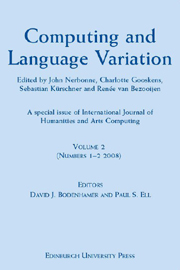Book contents
- Frontmatter
- Contents
- From the Editors
- Notes on Contributors
- 1 Introduction: Language Variation Studies and Computational Humanities
- 2 Panel Discussion on Computing and the Humanities
- 3 Making Sense of Strange Sounds: (Mutual) Intelligibility of Related Language Varieties. A Review
- 4 Phonetic and Lexical Predictors of Intelligibility
- 5 Linguistic Determinants of the Intelligibility of Swedish Words among Danes
- 6 Mutual Intelligibility of Standard and Regional Dutch Language Varieties
- 7 The Dutch-German Border: Relating Linguistic, Geographic and Social Distances
- 8 The Space of Tuscan Dialectal Variation: A Correlation Study
- 9 Recognising Groups among Dialects
- 10 Comparison of Component Models in Analysing the Distribution of Dialectal Features
- 11 Factor Analysis of Vowel Pronunciation in Swedish Dialects
- 12 Representing Tone in Levenshtein Distance
- 13 The Role of Concept Characteristics in Lexical Dialectometry
- 14 What Role does Dialect Knowledge Play in the Perception of Linguistic Distances?
- 15 Quantifying Dialect Similarity by Comparison of the Lexical Distribution of Phonemes
- 16 Corpus-based Dialectometry: Aggregate Morphosyntactic Variability in British English Dialects
16 - Corpus-based Dialectometry: Aggregate Morphosyntactic Variability in British English Dialects
Published online by Cambridge University Press: 12 September 2012
- Frontmatter
- Contents
- From the Editors
- Notes on Contributors
- 1 Introduction: Language Variation Studies and Computational Humanities
- 2 Panel Discussion on Computing and the Humanities
- 3 Making Sense of Strange Sounds: (Mutual) Intelligibility of Related Language Varieties. A Review
- 4 Phonetic and Lexical Predictors of Intelligibility
- 5 Linguistic Determinants of the Intelligibility of Swedish Words among Danes
- 6 Mutual Intelligibility of Standard and Regional Dutch Language Varieties
- 7 The Dutch-German Border: Relating Linguistic, Geographic and Social Distances
- 8 The Space of Tuscan Dialectal Variation: A Correlation Study
- 9 Recognising Groups among Dialects
- 10 Comparison of Component Models in Analysing the Distribution of Dialectal Features
- 11 Factor Analysis of Vowel Pronunciation in Swedish Dialects
- 12 Representing Tone in Levenshtein Distance
- 13 The Role of Concept Characteristics in Lexical Dialectometry
- 14 What Role does Dialect Knowledge Play in the Perception of Linguistic Distances?
- 15 Quantifying Dialect Similarity by Comparison of the Lexical Distribution of Phonemes
- 16 Corpus-based Dialectometry: Aggregate Morphosyntactic Variability in British English Dialects
Summary
Abstract The research reported in this paper departs from most previous work in dialectometry in several ways. Empirically, it draws on frequency vectors derived from naturalistic corpus data and not on discrete atlas classifications. Linguistically, it is concerned with morphosyntactic (as opposed to lexical or pronunciational) variability. Methodologically, it marries the careful analysis of dialect phenomena in authentic, naturalistic texts to aggregational-dialectometrical techniques. Two research questions guide the investigation: First, on methodological grounds, is corpus-based dialectometry viable at all? Second, to what extent is morphosyntactic variation in nonstandard British dialects patterned geographically? By way of validation, findings will be matched against previous work on the dialect geography of Great Britain.
INTRODUCTION
The overarching aim in this study is to provide a methodological sketch of how to blend philologically responsible corpus-based research with aggregational-dialectometrical analysis techniques. The bulk of previous research in dialectometry has focussed on phonology and lexis (however, for work on Dutch dialect syntax see Spruit 2005, 2006, 2008, Spruit et al. t.a.). Moreover, orthodox dialectometry draws on linguistic atlas classifications as its primary data source. The present study departs from these traditions in several ways. It endeavours, first, to measure aggregate morphosyntactic distances and similarities between traditional dialects in the British Isles. Second, the present study does not rely on atlas data but on frequency information deriving from a careful analysis of language use in authentic, naturalistic texts. This is another way of saying that the aggregate analysis in this paper is frequency-based, an approach that contrasts with atlas-based dialectometry, which essentially relies on categorical input data.
- Type
- Chapter
- Information
- Computing and Language VariationInternational Journal of Humanities and Arts Computing Volume 2, pp. 279 - 296Publisher: Edinburgh University PressPrint publication year: 2009



